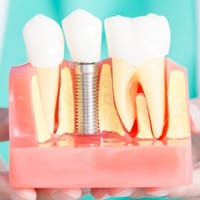
Dental implants are a popular and effective solution for missing teeth, providing patients with a natural-looking smile and improved oral health. However, it’s important to understand the risks associated with smoking and dental implants if you’re a smoker. Research shows that smoking can significantly impact the success of dental implant surgery, leading to complications that can compromise your overall oral health. In this article, we’ll explore how smoking affects dental implants and provide tips on quitting smoking before and after surgery to ensure the longevity of your new smile.
Smoking and Dental Implants: The Risks
Smoking is a well-known risk factor for various oral health issues, including periodontal disease, tooth loss, and oral cancer. However, smoking can also pose significant risks to dental implants. When you smoke, the harmful chemicals in tobacco products can impair your body’s natural healing process by reducing blood flow to your gums and jawbone.
This reduced blood flow can prevent proper fusion between the implant and the surrounding tissue, making it more difficult for the implant to integrate with your jawbone properly. This lack of integration could lead to implant failure or even cause damage to nearby teeth and gum tissue.
Additionally, smoking increases the risk of infection after surgery as it weakens our immune system’s ability to fight off bacteria. The bacterial growth around implants may result in peri-implantitis which is caused by inflammation that affects both soft tissues and bones supporting an implant.
Therefore if you’re considering dental implants and are a smoker, it’s essential to discuss these risks with your dentist before undergoing any procedure. It may be necessary for some smokers to quit before they become eligible candidates for this type of treatment—a decision that could ultimately lead to long-term success!
Quitting Smoking Before Dental Implant Surgery
Quitting Smoking Before Dental Implant Surgery
If you’re a smoker and considering getting dental implants, quitting smoking is an essential step to ensure the success of your procedure. Smoking can significantly increase the risk of implant failure by decreasing blood flow to the gums, slowing down healing time, and compromising bone growth.
Before undergoing any dental implant surgery, it’s crucial to quit smoking at least two weeks before your scheduled procedure. This will give your body enough time to start repairing the damage caused by smoking and improve your overall oral health.
Research has shown that quitting smoking even just for a short period before surgery can significantly impact the success rate of dental implant procedures. Patients who quit smoking two weeks prior had higher success rates compared to those who didn’t quit at all or only stopped one week before their procedure.
Quitting smoking may not be easy, but there are many resources available that can help make the process more manageable. Speak with your dentist or doctor about developing a plan tailored specifically for you so that together you can set goals and establish ways for achieving them.
Quitting Smoking After Dental Implant Surgery
Quitting smoking is not only important before dental implant surgery, but also after the procedure. Smoking can severely impact the healing process and increase the risk of implant failure.
Smoking affects blood flow and oxygen levels in your body, both of which are critical for proper healing. Nicotine causes constriction of blood vessels, reducing blood supply to the surgical site. This results in delayed tissue repair and increases the chances of infection.
Furthermore, smoking weakens your immune system making it difficult for your body to fight off infections that may occur at the surgery site. Dental implants can take several months to heal properly and any infection can have serious consequences.
It’s recommended that patients quit smoking entirely after their dental implant surgery to ensure optimal healing and reduce the possibility of complications. Although quitting smoking can be challenging, it’s worth it in terms of long-term oral health benefits.
Your dentist or healthcare professional can provide you with resources such as nicotine patches or medications that could help ease withdrawal symptoms while quitting smoke. It takes patience and commitment from patients’ end when trying to quit smoking, especially after a major medical procedure like dental implant surgery.
The Bottom Line: The Best Way to Protect Your Dental Implants is to Quit Smoking
Dental implants are a wonderful investment in your oral health and overall well-being. However, if you are a smoker, it is important to understand the risks associated with smoking and dental implant surgery. Smoking can decrease the success rate of your implant surgery by slowing down healing time or causing an infection.
Fortunately, quitting smoking before and after your dental implant surgery can significantly reduce those risks. Not only will you improve your chances of successful healing but also enhance your overall oral health.
So if you’re considering getting dental implants or already have them but still smoke, now is the perfect time to quit for good. Your dentist will be happy to provide additional support and resources if needed.
Remember: protecting your investment starts by taking care of yourself!
Share this Post







